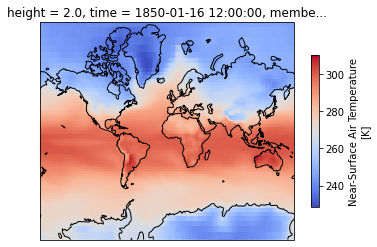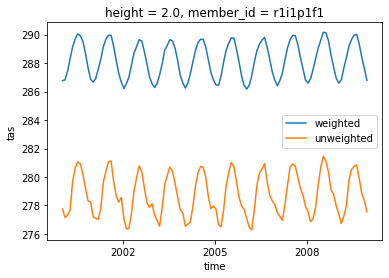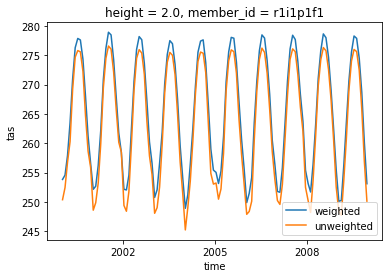Using masks and computing weighted average
Contents
Using masks and computing weighted average#
This example is based from xarray example http://xarray.pydata.org/en/stable/examples/area_weighted_temperature.html
Import python packages#
import xarray as xr
xr.set_options(display_style='html')
import intake
import cftime
import matplotlib.pyplot as plt
import cartopy.crs as ccrs
import numpy as np
%matplotlib inline
cat_url = "https://storage.googleapis.com/cmip6/pangeo-cmip6.json"
col = intake.open_esm_datastore(cat_url)
col
pangeo-cmip6 catalog with 7632 dataset(s) from 517667 asset(s):
| unique | |
|---|---|
| activity_id | 18 |
| institution_id | 36 |
| source_id | 88 |
| experiment_id | 170 |
| member_id | 657 |
| table_id | 37 |
| variable_id | 709 |
| grid_label | 10 |
| zstore | 517667 |
| dcpp_init_year | 60 |
| version | 715 |
Search data#
cat = col.search(source_id=['NorESM2-LM'], experiment_id=['historical'], table_id=['Amon'], variable_id=['tas'], member_id=['r1i1p1f1'])
cat.df
| activity_id | institution_id | source_id | experiment_id | member_id | table_id | variable_id | grid_label | zstore | dcpp_init_year | version | |
|---|---|---|---|---|---|---|---|---|---|---|---|
| 0 | CMIP | NCC | NorESM2-LM | historical | r1i1p1f1 | Amon | tas | gn | gs://cmip6/CMIP6/CMIP/NCC/NorESM2-LM/historica... | NaN | 20190815 |
Create dictionary from the list of datasets we found#
This step may take several minutes so be patient!
dset_dict = cat.to_dataset_dict(zarr_kwargs={'use_cftime':True})
--> The keys in the returned dictionary of datasets are constructed as follows:
'activity_id.institution_id.source_id.experiment_id.table_id.grid_label'
100.00% [1/1 00:00<00:00]
list(dset_dict.keys())
['CMIP.NCC.NorESM2-LM.historical.Amon.gn']
dset = dset_dict[list(dset_dict.keys())[0]]
dset
<xarray.Dataset>
Dimensions: (bnds: 2, lat: 96, lon: 144, member_id: 1, time: 1980)
Coordinates:
height float64 ...
* lat (lat) float64 -90.0 -88.11 -86.21 -84.32 ... 86.21 88.11 90.0
lat_bnds (lat, bnds) float64 dask.array<chunksize=(96, 2), meta=np.ndarray>
* lon (lon) float64 0.0 2.5 5.0 7.5 10.0 ... 350.0 352.5 355.0 357.5
lon_bnds (lon, bnds) float64 dask.array<chunksize=(144, 2), meta=np.ndarray>
* time (time) object 1850-01-16 12:00:00 ... 2014-12-16 12:00:00
time_bnds (time, bnds) object dask.array<chunksize=(1980, 2), meta=np.ndarray>
* member_id (member_id) <U8 'r1i1p1f1'
Dimensions without coordinates: bnds
Data variables:
tas (member_id, time, lat, lon) float32 dask.array<chunksize=(1, 990, 96, 144), meta=np.ndarray>
Attributes: (12/52)
Conventions: CF-1.7 CMIP-6.2
activity_id: CMIP
branch_method: Hybrid-restart from year 1600-01-01 of piControl
branch_time: 0.0
branch_time_in_child: 0.0
branch_time_in_parent: 430335.0
... ...
title: NorESM2-LM output prepared for CMIP6
tracking_id: hdl:21.14100/2486cf87-033c-4848-ab3e-e828c3b7c...
variable_id: tas
variant_label: r1i1p1f1
intake_esm_varname: ['tas']
intake_esm_dataset_key: CMIP.NCC.NorESM2-LM.historical.Amon.gnxarray.Dataset
- bnds: 2
- lat: 96
- lon: 144
- member_id: 1
- time: 1980
- height()float64...
- axis :
- Z
- long_name :
- height
- positive :
- up
- standard_name :
- height
- units :
- m
array(2.)
- lat(lat)float64-90.0 -88.11 -86.21 ... 88.11 90.0
- axis :
- Y
- bounds :
- lat_bnds
- long_name :
- Latitude
- standard_name :
- latitude
- units :
- degrees_north
array([-90. , -88.105263, -86.210526, -84.315789, -82.421053, -80.526316, -78.631579, -76.736842, -74.842105, -72.947368, -71.052632, -69.157895, -67.263158, -65.368421, -63.473684, -61.578947, -59.684211, -57.789474, -55.894737, -54. , -52.105263, -50.210526, -48.315789, -46.421053, -44.526316, -42.631579, -40.736842, -38.842105, -36.947368, -35.052632, -33.157895, -31.263158, -29.368421, -27.473684, -25.578947, -23.684211, -21.789474, -19.894737, -18. , -16.105263, -14.210526, -12.315789, -10.421053, -8.526316, -6.631579, -4.736842, -2.842105, -0.947368, 0.947368, 2.842105, 4.736842, 6.631579, 8.526316, 10.421053, 12.315789, 14.210526, 16.105263, 18. , 19.894737, 21.789474, 23.684211, 25.578947, 27.473684, 29.368421, 31.263158, 33.157895, 35.052632, 36.947368, 38.842105, 40.736842, 42.631579, 44.526316, 46.421053, 48.315789, 50.210526, 52.105263, 54. , 55.894737, 57.789474, 59.684211, 61.578947, 63.473684, 65.368421, 67.263158, 69.157895, 71.052632, 72.947368, 74.842105, 76.736842, 78.631579, 80.526316, 82.421053, 84.315789, 86.210526, 88.105263, 90. ]) - lat_bnds(lat, bnds)float64dask.array<chunksize=(96, 2), meta=np.ndarray>
Array Chunk Bytes 1.54 kB 1.54 kB Shape (96, 2) (96, 2) Count 2 Tasks 1 Chunks Type float64 numpy.ndarray - lon(lon)float640.0 2.5 5.0 ... 352.5 355.0 357.5
- axis :
- X
- bounds :
- lon_bnds
- long_name :
- Longitude
- standard_name :
- longitude
- units :
- degrees_east
array([ 0. , 2.5, 5. , 7.5, 10. , 12.5, 15. , 17.5, 20. , 22.5, 25. , 27.5, 30. , 32.5, 35. , 37.5, 40. , 42.5, 45. , 47.5, 50. , 52.5, 55. , 57.5, 60. , 62.5, 65. , 67.5, 70. , 72.5, 75. , 77.5, 80. , 82.5, 85. , 87.5, 90. , 92.5, 95. , 97.5, 100. , 102.5, 105. , 107.5, 110. , 112.5, 115. , 117.5, 120. , 122.5, 125. , 127.5, 130. , 132.5, 135. , 137.5, 140. , 142.5, 145. , 147.5, 150. , 152.5, 155. , 157.5, 160. , 162.5, 165. , 167.5, 170. , 172.5, 175. , 177.5, 180. , 182.5, 185. , 187.5, 190. , 192.5, 195. , 197.5, 200. , 202.5, 205. , 207.5, 210. , 212.5, 215. , 217.5, 220. , 222.5, 225. , 227.5, 230. , 232.5, 235. , 237.5, 240. , 242.5, 245. , 247.5, 250. , 252.5, 255. , 257.5, 260. , 262.5, 265. , 267.5, 270. , 272.5, 275. , 277.5, 280. , 282.5, 285. , 287.5, 290. , 292.5, 295. , 297.5, 300. , 302.5, 305. , 307.5, 310. , 312.5, 315. , 317.5, 320. , 322.5, 325. , 327.5, 330. , 332.5, 335. , 337.5, 340. , 342.5, 345. , 347.5, 350. , 352.5, 355. , 357.5]) - lon_bnds(lon, bnds)float64dask.array<chunksize=(144, 2), meta=np.ndarray>
Array Chunk Bytes 2.30 kB 2.30 kB Shape (144, 2) (144, 2) Count 2 Tasks 1 Chunks Type float64 numpy.ndarray - time(time)object1850-01-16 12:00:00 ... 2014-12-...
- axis :
- T
- bounds :
- time_bnds
- long_name :
- time
- standard_name :
- time
array([cftime.DatetimeNoLeap(1850, 1, 16, 12, 0, 0, 0), cftime.DatetimeNoLeap(1850, 2, 15, 0, 0, 0, 0), cftime.DatetimeNoLeap(1850, 3, 16, 12, 0, 0, 0), ..., cftime.DatetimeNoLeap(2014, 10, 16, 12, 0, 0, 0), cftime.DatetimeNoLeap(2014, 11, 16, 0, 0, 0, 0), cftime.DatetimeNoLeap(2014, 12, 16, 12, 0, 0, 0)], dtype=object) - time_bnds(time, bnds)objectdask.array<chunksize=(1980, 2), meta=np.ndarray>
Array Chunk Bytes 31.68 kB 31.68 kB Shape (1980, 2) (1980, 2) Count 2 Tasks 1 Chunks Type object numpy.ndarray - member_id(member_id)<U8'r1i1p1f1'
array(['r1i1p1f1'], dtype='<U8')
- tas(member_id, time, lat, lon)float32dask.array<chunksize=(1, 990, 96, 144), meta=np.ndarray>
- cell_measures :
- area: areacella
- cell_methods :
- area: time: mean
- comment :
- near-surface (usually, 2 meter) air temperature
- history :
- 2019-08-15T12:42:20Z altered by CMOR: Treated scalar dimension: 'height'. 2019-08-15T12:42:21Z altered by CMOR: Converted type from 'd' to 'f'.
- long_name :
- Near-Surface Air Temperature
- original_name :
- TREFHT
- standard_name :
- air_temperature
- units :
- K
Array Chunk Bytes 109.49 MB 54.74 MB Shape (1, 1980, 96, 144) (1, 990, 96, 144) Count 5 Tasks 2 Chunks Type float32 numpy.ndarray
- Conventions :
- CF-1.7 CMIP-6.2
- activity_id :
- CMIP
- branch_method :
- Hybrid-restart from year 1600-01-01 of piControl
- branch_time :
- 0.0
- branch_time_in_child :
- 0.0
- branch_time_in_parent :
- 430335.0
- cmor_version :
- 3.5.0
- contact :
- Please send any requests or bug reports to noresm-ncc@met.no.
- creation_date :
- 2019-08-15T12:42:21Z
- data_specs_version :
- 01.00.31
- experiment :
- all-forcing simulation of the recent past
- experiment_id :
- historical
- external_variables :
- areacella
- forcing_index :
- 1
- frequency :
- mon
- further_info_url :
- https://furtherinfo.es-doc.org/CMIP6.NCC.NorESM2-LM.historical.none.r1i1p1f1
- grid :
- finite-volume grid with 1.9x2.5 degree lat/lon resolution
- grid_label :
- gn
- history :
- 2019-08-15T12:42:21Z ; CMOR rewrote data to be consistent with CMIP6, CF-1.7 CMIP-6.2 and CF standards.
- initialization_index :
- 1
- institution :
- NorESM Climate modeling Consortium consisting of CICERO (Center for International Climate and Environmental Research, Oslo 0349), MET-Norway (Norwegian Meteorological Institute, Oslo 0313), NERSC (Nansen Environmental and Remote Sensing Center, Bergen 5006), NILU (Norwegian Institute for Air Research, Kjeller 2027), UiB (University of Bergen, Bergen 5007), UiO (University of Oslo, Oslo 0313) and UNI (Uni Research, Bergen 5008), Norway. Mailing address: NCC, c/o MET-Norway, Henrik Mohns plass 1, Oslo 0313, Norway
- institution_id :
- NCC
- license :
- CMIP6 model data produced by NCC is licensed under a Creative Commons Attribution ShareAlike 4.0 International License (https://creativecommons.org/licenses). Consult https://pcmdi.llnl.gov/CMIP6/TermsOfUse for terms of use governing CMIP6 output, including citation requirements and proper acknowledgment. Further information about this data, including some limitations, can be found via the further_info_url (recorded as a global attribute in this file) and at https:///pcmdi.llnl.gov/. The data producers and data providers make no warranty, either express or implied, including, but not limited to, warranties of merchantability and fitness for a particular purpose. All liabilities arising from the supply of the information (including any liability arising in negligence) are excluded to the fullest extent permitted by law.
- mip_era :
- CMIP6
- model_id :
- NorESM2-LM
- nominal_resolution :
- 250 km
- parent_activity_id :
- CMIP
- parent_experiment_id :
- piControl
- parent_mip_era :
- CMIP6
- parent_source_id :
- NorESM2-LM
- parent_sub_experiment_id :
- none
- parent_time_units :
- days since 0421-01-01
- parent_variant_label :
- r1i1p1f1
- physics_index :
- 1
- product :
- model-output
- realization_index :
- 1
- realm :
- atmos
- run_variant :
- N/A
- source :
- NorESM2-LM (2017): aerosol: OsloAero atmos: CAM-OSLO (2 degree resolution; 144 x 96; 32 levels; top level 3 mb) atmosChem: OsloChemSimp land: CLM landIce: CISM ocean: MICOM (1 degree resolution; 360 x 384; 70 levels; top grid cell minimum 0-2.5 m [native model uses hybrid density and generic upper-layer coordinate interpolated to z-level for contributed data]) ocnBgchem: HAMOCC seaIce: CICE
- source_id :
- NorESM2-LM
- source_type :
- AOGCM
- status :
- 2020-04-30;created; by gcs.cmip6.ldeo@gmail.com
- sub_experiment :
- none
- sub_experiment_id :
- none
- table_id :
- Amon
- table_info :
- Creation Date:(24 July 2019) MD5:08e314340b9dd440c36c1b8e484514f4
- title :
- NorESM2-LM output prepared for CMIP6
- tracking_id :
- hdl:21.14100/2486cf87-033c-4848-ab3e-e828c3b7c759 hdl:21.14100/8d2ec216-30d3-4f90-8664-7cf75e29780b hdl:21.14100/9f798305-d0cf-4eac-89b0-b13dc25574ca hdl:21.14100/e0da9277-4784-446b-b3b5-ba33bb18cc3a hdl:21.14100/ca48487c-955a-4b15-9582-5ce55ce39c73 hdl:21.14100/fc7602aa-fd09-49d8-94c6-e619622c211b hdl:21.14100/cd51a9c2-0a94-45b2-8d9b-59bcb3467214 hdl:21.14100/9b7ad334-1217-4229-98e8-b5a9287c0e5e hdl:21.14100/043ca527-40c7-451f-990b-ccc94720f612 hdl:21.14100/a9613498-ea0d-4be4-97e8-77661872798d hdl:21.14100/52699832-d86c-491b-a0a4-2f27d9ee4d69 hdl:21.14100/358c4a18-33b2-4c44-bd30-f6125a4df63c hdl:21.14100/77254eaf-90ca-44e7-9a3c-763a840e188f hdl:21.14100/62aed49c-6ca5-4027-80fe-4ddd99af575a hdl:21.14100/83ffe172-769b-42b1-b979-b92d768f60fd hdl:21.14100/91a8c4e2-d33b-4b87-a978-0247d8112ef3 hdl:21.14100/e8fb384f-d5a7-41e1-bf12-b8de3e2ffb80
- variable_id :
- tas
- variant_label :
- r1i1p1f1
- intake_esm_varname :
- ['tas']
- intake_esm_dataset_key :
- CMIP.NCC.NorESM2-LM.historical.Amon.gn
Plot the first timestep
projection = ccrs.Mercator(central_longitude=-10)
f, ax = plt.subplots(subplot_kw=dict(projection=projection))
dset['tas'].isel(time=0).plot(transform=ccrs.PlateCarree(), cbar_kwargs=dict(shrink=0.7), cmap='coolwarm')
ax.coastlines()
<cartopy.mpl.feature_artist.FeatureArtist at 0x7f91101352b0>

Compute weighted mean#
Creating weights: for a rectangular grid the cosine of the latitude is proportional to the grid cell area.
Compute weighted mean values
def computeWeightedMean(ds):
# Compute weights based on the xarray you pass
weights = np.cos(np.deg2rad(ds.lat))
weights.name = "weights"
# Compute weighted mean
air_weighted = ds.weighted(weights)
weighted_mean = air_weighted.mean(("lon", "lat"))
return weighted_mean
Compute weighted average over the entire globe#
weighted_mean = computeWeightedMean(dset)
Comparison with unweighted mean#
We select a time range
Note how the weighted mean temperature is higher than the unweighted.
weighted_mean['tas'].sel(time=slice('2000-01-01', '2010-01-01')).plot(label="weighted")
dset['tas'].sel(time=slice('2000-01-01', '2010-01-01')).mean(("lon", "lat")).plot(label="unweighted")
plt.legend()
<matplotlib.legend.Legend at 0x7f91113efd60>

Compute Weigted arctic average#
Let’s try to also take only the data above 60\(^\circ\)
weighted_mean = computeWeightedMean(dset.where(dset['lat']>60.))
weighted_mean['tas'].sel(time=slice('2000-01-01', '2010-01-01')).plot(label="weighted")
dset['tas'].where(dset['lat']>60.).sel(time=slice('2000-01-01', '2010-01-01')).mean(("lon", "lat")).plot(label="unweighted")
plt.legend()
<matplotlib.legend.Legend at 0x7f9110c6a040>



